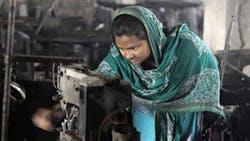DHAKA -- In a move Dhaka hoped would bolster a relationship damaged by the deadly collapse of a garment factory earlier this year, Bangladesh and the United States signed a trade agreement Monday.
Dhaka's foreign ministry said the Trade and Investment Cooperation Forum Agreement (TICFA), which was signed in Washington, would pave the way for regular discussion on trade and labour issues in the wake of a series of disasters that highlighted appalling conditions in Dhaka's $22 billion garment industry.
The U.S. is the biggest destination for Bangladeshi apparel with two-way goods trade between the countries totalling $5.4 billion in 2012, according to the Office of the United States Trade Representative (USTR) website.
Acting Deputy USTR, Wendy Cutler, and Bangladesh Commerce Secretary, Mahbub Ahmed, signed the pact, Dhaka's foreign ministry spokesman Shameem Ahsan said.
Ahsan quoted USTR Michael Froman as saying that the deal would provide a "formal mechanism" for talks.
The US suspended duty-free trade access to some Bangladeshi products in June in the wake of the Rana Plaza garment factory collapse that killed 1,135 people.
Bangladesh ambassador Akramul Qader called the accord "an opening of a new chapter" in the ties between the two nations and said it would help Dhaka reclaim trade privileges in the US.
"This will pave the way for stronger engagement between the parties to resolve some crucial trade issues" including duty-free and quota-free access to Bangladeshi exports in the U.S. market, Qader said.
Bangladesh has enacted a series of reforms including easing curbs on labor unions and raising the rock-bottom wages of the country's four million workers in its effort to reclaim trade benefits.
Bangladeshi trade officials have said Washington proposed the deal several years ago, but Dhaka resisted signing the accord due to concerns it could lead to scrutiny of the country's poor labour and intellectual property laws.
Dhaka's position reversed after it came under intense pressure from the U.S. and European Union to improve working conditions in the country's 4,500 garment factories, following the April 24 collapse at Rana Plaza where workers were making clothing for Western brands including top US retailers.
Copyright Agence France-Presse, 2013
About the Author
Agence France-Presse
Copyright Agence France-Presse, 2002-2025. AFP text, photos, graphics and logos shall not be reproduced, published, broadcast, rewritten for broadcast or publication or redistributed directly or indirectly in any medium. AFP shall not be held liable for any delays, inaccuracies, errors or omissions in any AFP content, or for any actions taken in consequence.
